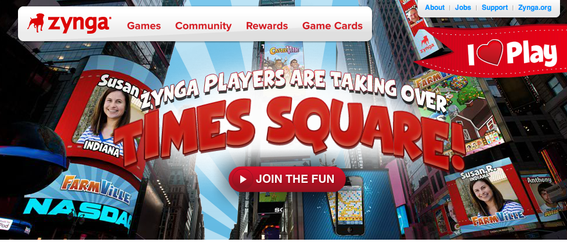The market for technology stocks is closing the year on a less than happy note and the disappointing public debut of online game provider Zynga did nothing to change the mood.
Zynga’s Opening Day
Zynga’s IPO was highly anticipated despite the fact that in the days prior to going public last week, the company reduced its intended valuation by 50 percent. The stock was priced at $10 a share and closed on its opening day at $9.50. This past Monday it dropped further to close at $9.05, despite the company being profitable. On Wednesday, the stock closed at $9.47.
According to Standard & Poor’s Capital IQ, only seven U.S. tech IPOs have closed below the offering prices on the first day of public trading. More ominously, those seven companies saw their stocks drop on average 52 percent after the IPO date.

Zygna’s home page.
Zynga did sell about 14 percent of its total shares in the IPO, a larger float than is typical for technology companies, which commonly sell between seven and ten percent of available shares. The larger percentage probably dampened the price. However, strategic and structural issues that I discussed in a previous article, “Zynga Opens the Kimono; We See Facebook,” were most likely the bigger contributors to the low price.
Zynga is almost totally dependent on Facebook for its revenue and Facebook could change the terms of its agreement with Zynga or become a competitor at any time. For instance, in 2010, Facebook made all gaming companies convert to Facebook Credits as currency to pay for virtual goods. As a result, Zynga, which was paying an average of two to ten percent fees on virtual goods sold to game players, had to start paying Facebook 30 percent of its revenues.
The Zynga Numbers
In 2011, according to Zynga CFO Dave Wehner, 8 million game players bought virtual goods. While that may sound impressive, the number represents about five percent of the active Zynga users, estimated at 150 million per month. Nevertheless, sales of virtual goods contribute 95 percent of revenue. Advertising revenue is about $55 million this year, an impressive increase of 162 percent over last year. But advertising contributes just five percent of total company revenue.
Zynga’s Weaknesses
Another disturbing trend is a decline in new players for existing games. While the most popular games like Farmville have peaked, new games are being introduced at a slower pace and may be cannibalizing players from the older games. Plus they don’t seem to be generating as many players as the very popular original games such as Farmville and Cityville. Also, Zynga’s growth in overall number of players is slowing. Its share of daily Facebook gamers has fallen from 50 percent to 38 percent, according to the Cowen Group, an investment firm. Zynga’s daily active user numbers have not grown much for nine months and it faces more competition from traditional gaming companies such as Electronic Arts, which acquired Zynga’s social-gaming rival Pop Games.
To gain a new audience Zynga will have to become more competitive in the mobile arena. Last December, it bought Texas-based mobile game development company Newtoy, the creator of the popular Games With Friends brand that includes mobile games such as Words With Friends and Chess With Friends. This past summer Zynga acquired Five Mobile, a Canadian mobile application development company that specializes in multi-platform development across various smartphone platforms. Zynga has already introduced a mobile version of Zynga Poker and as of October had 11 million average daily mobile users. It will have to grow its mobile market substantially to attract new users and new revenue.
The Future of Internet IPOs
The financial community is nervous about next year’s IPO market. Technology companies, usually the stars of the market, have had very mixed results this year and the disappointing Zynga showing may affect IPOs in the first half of 2012.
Many people are wondering about the effect Zynga’s IPO will have on Facebook, which will likely file an IPO early next year. One analyst, Francis Gaskins, president of IPO Desktop, says that any slowdown at Zynga will negatively influence Facebook, which he says gets 30 percent of its after tax income from Zynga even though Zynga players are less than one percent of Facebook users.
The market may be undergoing a correction to the high valuations of the technology sector, or perhaps investors are recognizing the sector’s fragility. The financial bubble that occurred ten years ago resulted from a lot of undeserved hype, but most companies that issued IPOs had tangible products that businesses and consumers could purchase. Now we have companies that earn revenues from virtual farm animals (Zynga) or from advertising (Facebook). Both companies have free offerings, making it easy to attract users.
Zynga employs 2,800 people and Facebook employs 2,500, far fewer than large companies that manufacture goods, and they have minimal capital assets. Yet the investment community has valued both companies at phenomenally higher amounts than more traditional companies. Other Internet companies contemplating going public may wish to think about the fact that enticing users to free game and social media sites is relatively easy; pulling in investors may be another story.





